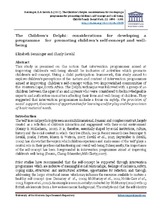| dc.contributor.author | Benninger, Elizabeth | |
| dc.contributor.author | Savahl, Shazly | |
| dc.date.accessioned | 2018-08-31T11:52:29Z | |
| dc.date.available | 2018-08-31T11:52:29Z | |
| dc.date.issued | 2017 | |
| dc.identifier.citation | Benninger, E. & Savahl, S. (2017). The Children’s Delphi: considerations for developing a programme for promoting children’s self-concept and well-being. Child & Family Social Work, 22: 1094 – 1103. | en_US |
| dc.identifier.issn | 1356-7500 | |
| dc.identifier.uri | http://dx.doi.org/10.1111/cfs.12329 | |
| dc.identifier.uri | http://hdl.handle.net/10566/3986 | |
| dc.description.abstract | This study is premised on the notion that intervention programmes aimed at improving children’s well-being should be inclusive of activities which promote children’s self-concept. Using a child participation framework, this study aimed to explore children’s perceptions of the nature and content of intervention programmes aimed at improving children’s self-concept within two impoverished communities of the Western Cape, South Africa. The Delphi technique was followed with a group of 10 children between the ages of 10 and 12 years who were considered to be knowledgeable experts and authorities on matters affecting their lives and well-being of children. They suggested that intervention programmes include a focus on safety, the provision of social support, the creation of opportunities for learning and for play and the provision of basic material needs. | en_US |
| dc.language.iso | en | en_US |
| dc.publisher | Wiley | en_US |
| dc.subject | Child participation | en_US |
| dc.subject | Child well-being | en_US |
| dc.subject | Delphi | en_US |
| dc.subject | Self-concept | en_US |
| dc.title | The Children’s Delphi: considerations for developing a programme for promoting children’s self-concept and well-being | en_US |
| dc.type | Article | en_US |

